After reading “A Boot Stamping On A Human Face Forever” by my dear friend, Alexander Wallace, I came to recognize his point- the idea that this world is a cruel one, that the history of the human race is consumed by evil and negativity. The title of his article, referencing a passage from the masterpiece, 1984 by George Orwell, encapsulates what he sees of humanity and its history: a bleak tale of perpetual sadness and misery.
I’m not going to deny the historical facts that are presented in my friend’s article; it is certainly true that human history entails a great amount of suffering. While studying history, I find that there is a certain sense that humanity never truly does seem to get it “right.” Wallace notes this as well, stating that studying history and what it entails have made him a cynic.
I honestly cannot blame him for this, as his reasoning is perfectly valid from many angles: given the atrocities he mentioned, including events ranging from the Holocaust to various war crimes, history and the human race come across as highly depressing, leaving behind a bad taste almost inconceivable in its misery.
However, it is my opinion that it is not necessarily contradictory to believe the world certainly can be and is, in many respects, a sad, cruel place, while also believing that humanity as a race has great promise and the ability to overcome anything it sets its mind to. In saying this, I realize I do fall into the demographic Wallace presents as being optimistic and sheltered to the point of naïveté: I am indeed an upper-middle class, sheltered, leftist college student.
That being said, I have taken the time to think critically about history and what it represents. I understand that my life is a greatly privileged, happy one when compared to the rest of humanity, both in the present-day and when set in comparison to the rest of history. However, that does not mean my somewhat optimistic mindset is inherently flawed and incorrect.
Nuance always exists in historical interpretation, and I believe that while great tragedy is present in history, it is unfair to portray it as mostly negative in such a broad sense. In fact, it would be just as naïve to view history through a purely cynical lens as it would be to see it through rose-tinted glasses.
In adopting cynicism and a negative understanding of the world, we set a self-fulfilling prophecy for ourselves. The idea of this world being inherently negative is constantly reinforced depending on how you view it on a personal level. Atrocities have constantly occurred throughout history and will likely continue to happen to an extent. However, this does not necessarily mean that the entire past, present, and future of humanity is hopeless. Humans are far from perfect- to be human is to be flawed. Humans are capable of great good as much as they are capable of great evil.
I do not believe it is valid to portray the concentration camp at Auschwitz as an encapsulation of the human race. While Wallace mentions Oskar Schindler in his article, he downplays the moral impact of his actions. Human good is much more meaningful in the face of hellish adversity, as was in his case. Humanity, as a species, is far greater than the atrocities of the Nazi regime.
Sure, it is far from perfect, but at the same time, it is not inherently evil and consumed by self-interest as Wallace asserts. The Nazi regime was beaten and recognized as an unmistakable evil. While its apologists glorify it to this day, there is no denying there are people out there who counter its legacy, who seek to shape the future in a way that will bring humanity above the dark aspects of its past.
As a history major and aspiring historian, I find that history is rooted in both the humanities and social sciences: it consists of both hard facts as well as a great deal of interpretation. Without getting too deep into certain aspects of history and their implications, I think it is completely fair to say that studying history does not have to make one a cynic.
As terrible and heartbreaking as the Holocaust was, it cannot be denied that today there is a great collective shame over its occurrence. For all of humanity’s evil, self-interest, and imperfection, there always exists a sense of idealism and goodness, humanity’s belief that it can aspire to great things, that it can achieve self-improvement in spite of all its faults.
Though Wallace disparages the idealism of college students and is not wrong in pointing out the naïveté possessed by a great many of us (myself included), I find that college campuses, in a way, encapsulate the great strength of humanity. At universities, there may be indeed a large number of those who care about social issues who may disregard their own hypocrisy or see the world as an uncharacteristically positive one. However, I would not simply write off such characteristics as completely flawed.Such students are idealistic, which I do not think is a bad thing. Idealism may leave people somewhat deluded about the world, but it is a powerful agent of change. It can fuel the self-improvement of humanity and its aspirations. In being cynical, the great hope and drive toward a better future is lost. Great good can indeed be found throughout history, whether it be the empirical data that supports it or the very belief that lives can be improved, as seen through history’s many revolutions and rebellions (which of course, are very far from wholly positive but represent mankind’s yearning to improve itself).History and humanity are incredibly flawed and should be recognized as such. However, I inherently disagree with cynicism: it disregards the ability of humanity to reshape itself, to strive to be better and work toward self-improvement. A self-defeating mindset will only fulfill its own grim predictions















